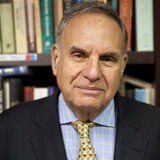Jewish High Holidays and the Mosque Near Ground Zero
Without Conversation, Reconciliation Is Impossible
The Jewish High Holidays are upon us. On Wednesday evening, September 8, Jews in Santa Barbara and throughout the world will gather in their synagogues to celebrate Rosh Hashana, the Jewish New Year, initiating a 10-day period called the Days of Awe. It is a time of enhanced spirituality continuing through Yom Kippur, the Day of Atonement, when Jews remain in their synagogues praying and fasting from early morning until stars appear in the evening sky.

The liturgy, melodies, and rituals of these Days of Awe are memorable. Hearing and seeing things we first experienced as children reminds us of how far we’ve come, and also how old we’ve grown. There’s so much to be done to make ourselves better people and the world a better place—a challenge Judaism presents to us every day, but especially at this season. And there’s so little time.
The Days of Awe do not promise instant success. Nor are we encouraged to seek it. The Jewish notion of sin is straying from the path of righteousness. Getting back on the path entails small steps.
High Holiday services are long and somewhat repetitious. I sometimes wonder why prayers need to be repeated. Doesn’t God hear them the first time? Perhaps the reason is that repetition affords the worshipper latitude to drift away from the printed text, and then return, having missed nothing.
I came to appreciate this when I retired from the active rabbinate two years ago, and no longer had to pay strict attention to the service I was leading. Now comfortably settled into my pew at Congregation B’nai B’rith, enjoying the inspired leadership of its outstanding rabbis and cantor, I can allow my mind to wander off into silent conversations. One is with my conscience, seeking a candid assessment of areas of my life that need improvement. A second is with God, who assures me that what needs to be done can be done, while warning that it will take a lot of hard work.
After services, and in the days ahead, there will conversations with family, friends, and associates I may have harmed during the past year either deliberately or through thoughtlessness. A central facet of repentance is reconciliation. Without conversation, reconciliation is impossible.
There is in this a good lesson for our nation’s leaders and media influentials. Civil discourse is on the endangered list in this country. Not so long ago, Democrats talked to Republicans and vice versa. From these exchanges emerged some fine bipartisan legislation hammered out by men and women with vastly differing views on almost everything: John McCain and Russ Feingold on campaign finance reform, the late Ted Kennedy and Orrin Hatch on health insurance for children. Cooperation of this nature is virtually impossible today, especially when Fox News and CNBC talking heads fan the flames.
Perhaps the most tragic consequence of this growing incivility is the verbal warfare—“controversy” is too charitable a characterization—over plans to build an Islamic community center in Lower Manhattan, not far from Ground Zero.
This is an issue that cries out for reasoned, respectful discussion. There are powerful arguments on both sides. Muslims assuredly have the right to build a mosque wherever they choose. But doing something because you have a right to do it doesn’t always mean that you’re doing the right thing.
One columnist noted that “when Pope John Paul II ordered the Carmelite nuns to leave the convent they had established at Auschwitz, he was in no way devaluing their heartfelt mission to pray for the souls of the dead. He was teaching them a lesson in respect: “This is not your place, it belongs to others. However pure your voice, better to let silence reign.”
Sponsors of the project have indicated their willingness to build it elsewhere in Lower Manhattan. But compromise is undermined by inflammatory statements, such as Newt Gingrich’s outrageous proclamation that building a mosque near Ground Zero is tantamount to Nazis putting up a sign at the entrance to the Holocaust museum in Washington. With this vitriol in the air, compromise becomes tacit agreement with Gingrich’s slanderous analogy.
The mosque’s supporters are not blameless. In his eloquent defense of the project, citing America’s rich tradition of religious tolerance, New York Mayor Michael Bloomberg regrettably left no room for people who oppose the mosque for reasons other than prejudice. If you’re against it, you’re a bigot, he seemed to be saying.
The verbal war continues, with each side deaf to the other’s concerns. People shout at, but do not talk to, one another. Islam is defamed by bigots, and poorly defended by apologists with their unrealistic denial of any connection between its teachings and the atrocities committed in its name on 9/11. A teachable moment is lost. So is a piece of our nation’s soul. At the dawn of a new Jewish year, I pray that we can reclaim it.
This article was originally posted under the misleading title “Jewish High Holidays and the Mosque at Ground Zero.” The word “at” has been changed to “near.” Our apologies.



